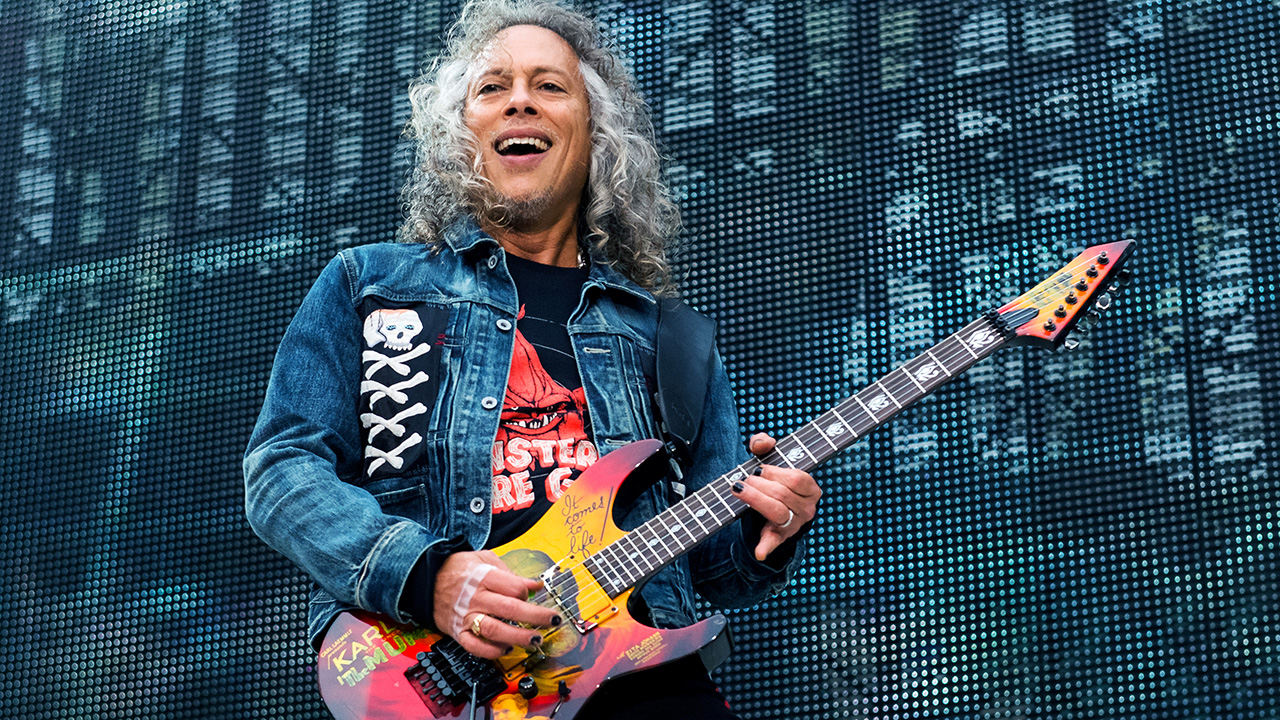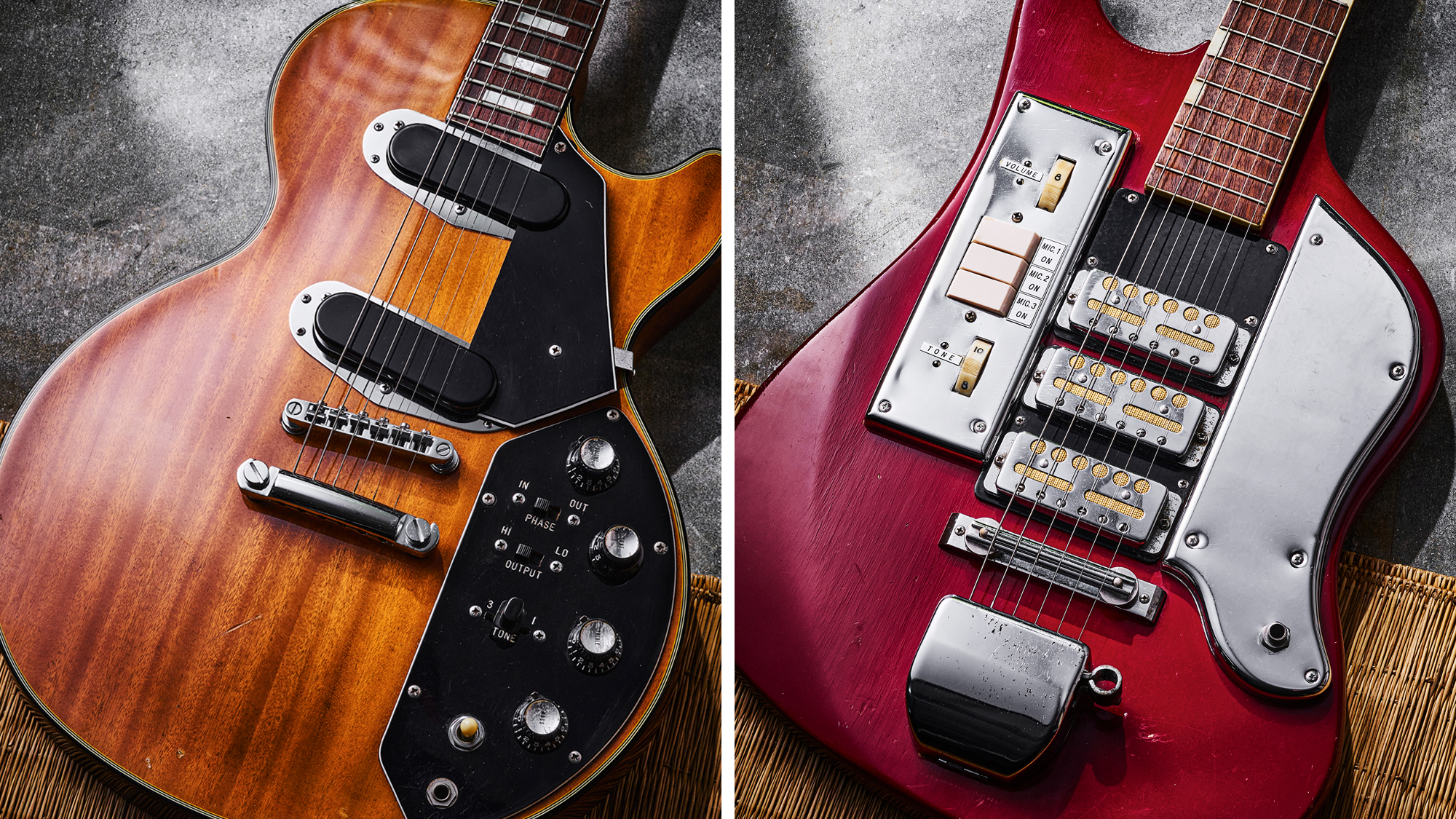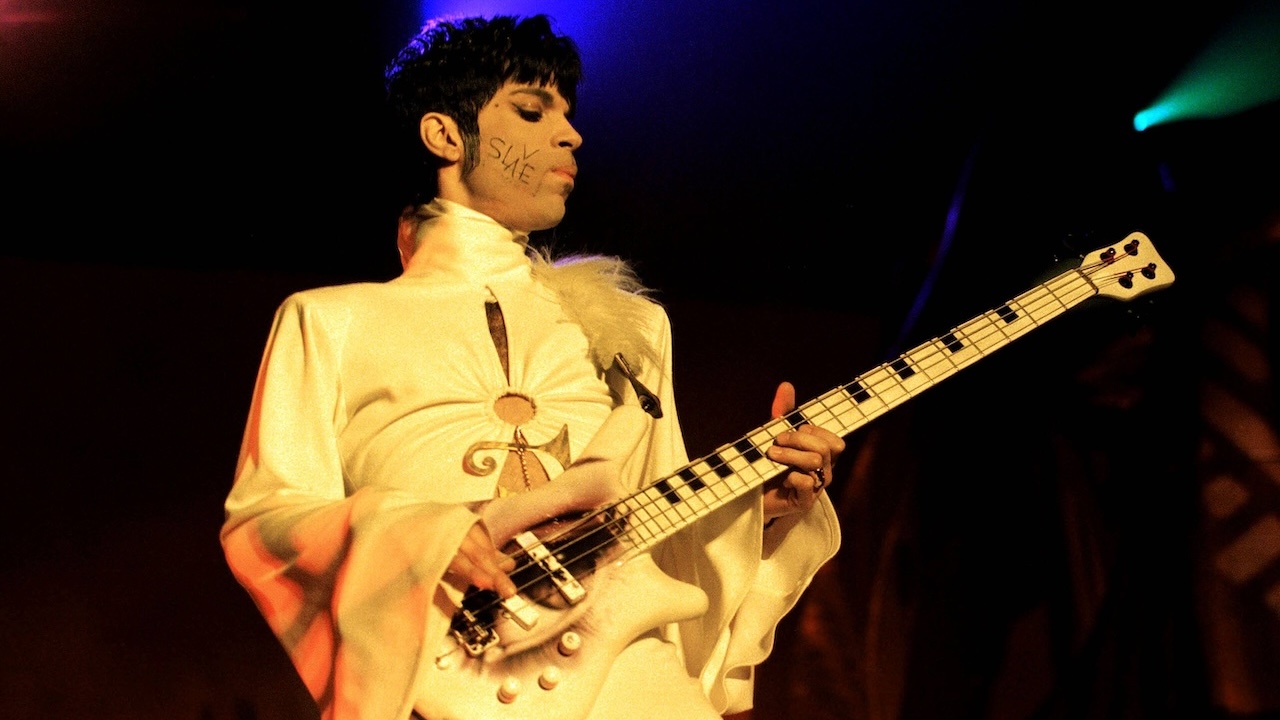Evanescence: “Guitarists need to be honest. Use your voice. We don’t need fake – we need humanity and real people”
Jen Majura and Troy McLawhorn wax lyrical on the high-octane gear, influences and themes behind the band's upcoming fifth album, The Bitter Truth
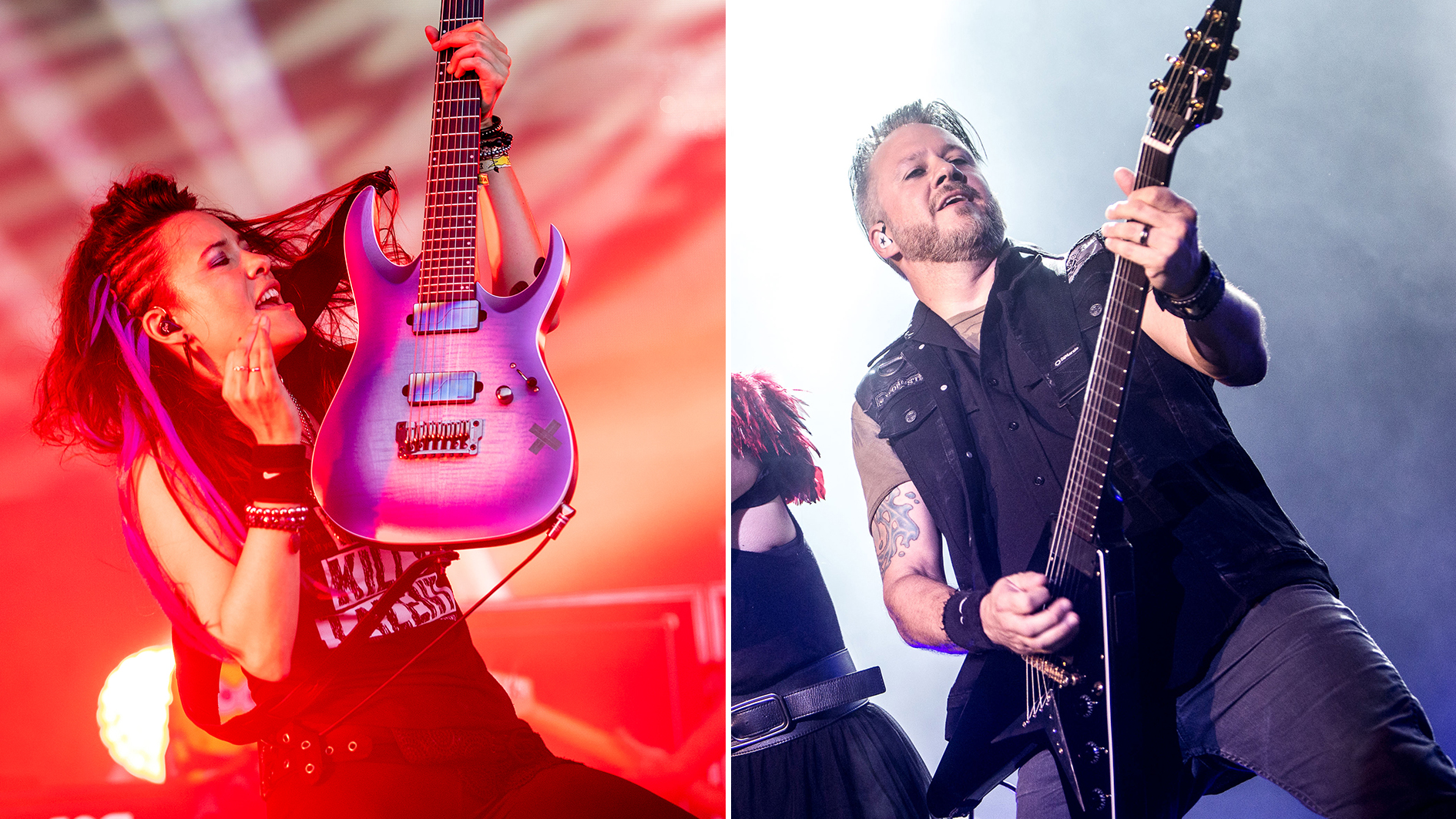
The Bitter Truth, the fifth full-length from Evanescence set for release in March 2021, will be their first album of new material in a decade. The American arena group led by singer/keyboardist Amy Lee had already released three singles, though the record’s completion was stalled by the virus pandemic that dominated headlines for much of the year.
The first sessions took place at the beginning of 2020 with rock super producer Nick Raskulinecz [Foo Fighters, Rush, Alice In Chains] in his Nashville studio, spawning the tracks we’ve heard so far – Wasted On You, The Game Is Over and Use My Voice. Then, of course, came Covid, putting an end to safe travel and forcing virtually all plans to change.
For the members in America, it was incredibly problematic. For German guitarist Jen Majura, who joined in 2015, it was an absolute nightmare. Nevertheless, the group kept chiseling away and fleshing out their parts for album number five.
When Guitar World tracks down Majura and co-guitarist Troy McLawhorn towards the end of 2020, things are still very much in the process of being finalized...
Looking back now, that session in Nashville must feel like a very long time ago!
Majura: “Definitely! What hit me so hard was that we’d recorded that first chunk of songs and waved goodbye at the airport, thinking we’d be back in a couple of weeks. And then suddenly this pandemic hit, airports were all shut!
“I had never felt more apart from my friends in the States than since this all started. It’s so unnatural for me not to be there! I’m very old-school – I like my tube amp and 4x12 cabinet. I like to sit in the studio with the humans I’m working with and creating in the moment.
Get The Pick Newsletter
All the latest guitar news, interviews, lessons, reviews, deals and more, direct to your inbox!
“Being away from Amy and the boys while working on material has felt so unnatural to me, but that’s the we have to do it and we have to make the best out of it. The time we spent with Nick in Nashville was the happiest ever.
“It felt amazing to see these songs coming to life – you have this idea but when you are all in a room creating, things change and become better, you end up trying out different ways. It’s such a vibrant and beautiful way of working. But I get it, there’s this thing called corona, so you know…”
There’s a lot of good stuff like that on this one, stuff that people will be surprised by maybe. There’s a fair amount of that aggressive type of music, but it’s a good mixture
Troy McLawhorn
This will be your first album working together on new material. How do you go about splitting guitar parts?
McLawhorn: “Whenever we’re jamming, if someone comes up with up something cool, they play it. There’s no set thing. So far I’ve probably played the majority of the lead guitar – if Jen comes up with something she is always welcome to play whatever it is. It’s a good working relationship. The first batch of songs, the first three that came out, were done in one session before the coronavirus hit. We were all together for those ones.
“But then Jen flew home back to Germany and we were supposed to tour in Europe, but it all got cancelled. Everything we’ve done since then has been without Jen with us, we’ve been kinda flying sessions back and forth. I probably played a lot of the guitar on the album, but she’s been coming up with cool ideas and putting her stamp on it too.”
The Game Is Over definitely feels like the heavier side of Evanescence…
McLawhorn: “There’s a lot of good stuff like that on this one, stuff that people will be surprised by maybe. There’s a fair amount of that aggressive type of music, but it’s a good mixture. So far everyone’s heard the lighter side of the album, like Use My Voice and Wasted On You… but then there’s The Game Is Over. It was a lot of fun to play and there’s more heavy stuff on there too!”
Majura: “That bridge is so heavy, I love it! It’s going back to the real rock roots and having lots of fun. When you have a low-tuned guitar you have to be a bit careful – you can’t just smash your strings but they will warp a bit.
“I remember forcing myself, especially during the bridge, to play gentle even though it had this badass attitude. It took me a couple of takes… the first ones were completely out of tune [laughs]!”
Jen, it must have been a rollercoaster five years for you. How did you end up getting the gig?
Majura: “What happened was that I was playing bass in another band, not really being happy as I’m a guitar player. We happened to play two festivals, one in Germany and one in the Czech Republic. And it turns out Testament were playing the same days as us.
“I’m a huge Alex Skolnick fan, so we ended up talking and keeping in touch. A couple of days later, I got this very mysterious email from him saying, ‘Jen! Some friends of mine are going to contact you and I can’t reveal too much but I think it’s something you should say yes to!’ I was wondering what the hell he was talking about…
“And then a day later, I got this email from Evanescence’s management asking if I would be interested in… and I didn’t even finish reading the email. I just immediately replied ‘Yes!’ and sent it. That was a total no-brainer.
“So this was around July 2015 and the next evening I was on the phone with Amy talking. She invited me to come visit her in New York and hang out. I thought, ‘Okay… cool!’ and three days later I was on a plane flying to fuckin’ New York wondering if this was really happening. It was insane.”
Did you bring your guitar?
The world is full of virtuosos – you also need someone who can commit to touring, being on the road and that whole lifestyle
Jen Majura
Majura: “I didn’t! I asked her if I needed to bring one and she said, ‘Nah, I know you can play, I’ve seen plenty of videos – let’s just hang out!’ And that’s exactly what we did for the next three days. Hanging out, long walks and talks, going out for dinner or to a concert. Becoming friends and getting to know each other on a more human relationship kind of base.
“I realize now that’s the biggest deal when you have to replace a member. A band is a family. I’d like to quote Rob Zombie on that, because he said it in the movie Hired Gun!
“Finding a good player is the easy part – the world is full of virtuosos. You also need someone who can commit to touring, being on the road and that whole lifestyle. The third and last thing, also the toughest, is that you need people you can stand hanging out with 24/7.
“Concerts are only 90 minutes – what about all the other hours in the day? You need to all fit together. Within those first few days with Amy, I realized we both had a strong work ethic and know exactly what we want, which is beautiful.
“She’s a very strong character. I appreciate her musicality and personality too, she quickly became one of my best friends because we laughed about the same things and then figured out we both love Sex and the City [laugh]! I am so grateful and thankful to have experienced everything I have with her and the boys.”
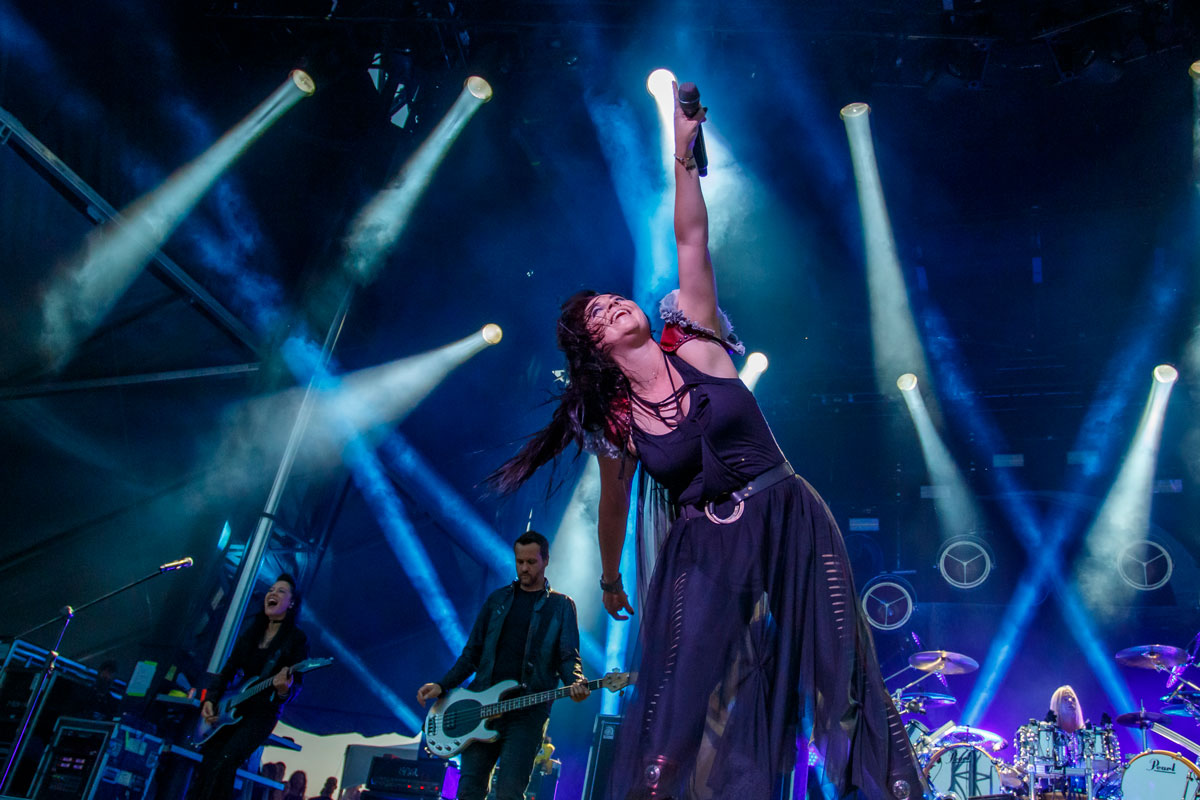
Troy, you’ve been a member of Seether and filled in for Sevendust on some tours, but you’ve been an on/off member of Evanescence for over a decade now…
McLawhorn: “Yeah, to be honest, I never really left Evanescence. We have big breaks between albums. When I did my first tour with the band, Amy told me she was taking a long break, probably around four or five years. I just went out to find something to do in the meantime and ended up playing in Seether for a few years…
“When it was time for me to leave, it coincided with Amy being ready to do another album. And it was a huge coincidence. I ended up in New York and went to Amy’s house. I was having trouble in Seether and wasn’t happy there, and she said she’d love me to come work on the new album. That’s how it all went down.
“There seems to be some pretty long breaks in between albums with this band but I think that’s part of Amy’s creative process. She likes to take her time when she’s writing the lyrics. The final product always turns out really nice that way, so why mess with it?”
What can you tell us about the gear responsible for the guitar sounds on this album?
When I joined Synergy Amps, I think Steve Vai was the only big name working with them, but I figured if it’s Steve Vai it’s gotta be f**king great
Jen Majura
Majura: “I signed up with Synergy Amps in November last year. When I joined, I think Steve Vai was the only big name working with them, but I figured if it’s Steve Vai it’s gotta be fucking great. So I went over to check their amp out and I was very skeptical. It looks like a tube amp but with all these holes and parts missing!
“But I plugged in, hit one chord and realized it was actually phenomenal. They’ve sent all the different modules to me, like the Diezel, and the perfect solution for me was the Friedman HBE. It has the perfect rock and roll sound for my solos but it also has the mighty depth of high-gain stuff too – which are all frequencies you need for Evanescence.
“I was originally expecting I’d go with the Diezel one, but the Friedman felt more right for me. I’m very open-minded when it comes to technology. You have two modules, each with two channels, so you get a four-channel amp made out of your favorites.
“For example, I could combine a Vox AC30 Brian May sound with a Diezel VH4. It’s phenomenal what they’ve managed to open up for us musicians in terms of sound options. It’s been my tour rig and studio rig ever since.”
McLawhorn: “I used a combination of different things on this album. On The Game Is Over, it was basically my live setup which is an Orange Rockerverb 100, with an analog pedalboard.
![[L-R] Amy Lee and Troy McLawhorn of Evanescence](https://cdn.mos.cms.futurecdn.net/zWaDzagiHhYbRhVyQB8avh.jpg)
“A big part of the tone I get from the amp comes down to a 10-band EQ I use to boost the mids on the lead channel. That’s about it – I don’t really use overdrive pedals or anything like that and probably use less gain than most modern guitarists. I almost use EQ to find a modern sound, instead of more gain.
“I also have a Fractal Axe-Fx III, which I’ve used here and there on the album, especially for clean parts – it’s really good for that. I’ve done some overdubs with the II as well, stuff that has a lot of effects or sounds really wet – Axe-Fx is great for that, too. I also have a 1969 Marshall Superbass 100 which we split with a Bogner Ecstasy or Uberschall, and used for the rhythm tracks on a couple of songs.”
And how about for guitars?
Some instruments seem to instantly merge with your system – you become one – and that is true of most Ibanez guitars, at least for me
Jen Majura
Majura: “I’ve been with Ibanez for many years now and I’m very happy. They deliver the most perfect instruments. You pick up an instrument and either like it or not. Some of them seem to instantly merge with your system – you become one – and that is true of most Ibanez guitars, at least for me.
“Of course I’ve played Les Pauls and other things, but they’re really not my style. I have so many Ibanez guitars now. I think the AZ series was such a smart move – the family is even bigger and better now… Look at players like Tim Henson, who is just amazing. He makes me feel so old. He’ll be nailing it and I’m at home just playing along to AC/DC or something!
“For pedals, I stick with the Line 6 Helix pedalboard because I remember at my first rehearsal in 2015, they would tell me certain parts would need a chorus or flanger or this or that. At the end of the rehearsal I had a battery of pedals in front of me and realized I couldn’t do it. I’ve never been a pedal dancer. I went to Line 6 asking for a solution and they were just about to come out with the Helix… it was perfect.”
McLawhorn: “I was using a baritone PRS SE. I changed the pickups out, but that’s it – I love the guitar and how it plays. I tried a few different sets, most by Seymour Duncan. One of my seven-strings has a Seymour that my tech put in on the road and I don’t know which one it is! He just found it in my guitar coffin and asked if we should throw it in. It stayed for the rest of the tour – it was probably a JB, who knows!
“But the one on the record is the Distortion (SH-6). I really like how they sound. At first, they were a little hot for what I like – I tend to prefer somewhere in between modern metal and classic rock. It felt like really high gain, way too much, especially when switching from my other guitars. But he really lowered the pickup down and that fixed everything, making everything super-tight and adding some nice mids.”
Use My Voice has a really powerful message behind it…
Majura: “Yes! Another thing that connects me and Amy very strongly is that we both went through moments in our careers where males would tell us, ‘You’re just a girl – what do you know?’ It’s time for strong women – in rock or wherever – to stand up and say being good at a craft has nothing to do with gender. It’s been happening for way too long.
“That feeling of our voices being suppressed needs to change, because every voice matters. We’re all the same. It does not matter if you are male or female or transgender… humans are humans. I think we should spend more time understanding why we’re the same. Use My Voice is an important message for women to stand up and be heard.”
Where do you think your influences differ as guitar players?
Majura: “The first guitar hero I had at around 10 or 11 was Steve Vai. He was so revolutionary in terms of what he’s done for the guitar world, both sound-wise and crafts-wise. Electric guitar wouldn’t be what it is today without Steve Vai.
“I respect him so much for how he feels and talks through his instrument. He’s influenced my thinking about a lot of things. He’s an amazing person, not just an amazing musician.
“Then I got into Nuno Bettencourt, who plays for the sake of the song instead of showing off. Which is what I tried to do on my first solo album, Inzenity, everyone expected a shred album and it wasn’t. I played for the song. If it didn’t require a guitar solo then fine, I’d just leave it. I didn’t need to prove to the world how good I was.
Electric guitar wouldn’t be what it is today without Steve Vai
Jen Majura
“Nuno also has the percussive style of playing, which brings this tone that I really like. And finally, Angus Young. I’ve been playing in an AC/DC tribute band for four years and I love his playing.”
McLawhorn: “A lot of them for me were the classic players while I was growing up. So Ace Frehley for sure… KISS were like Slipknot for us who grew up in the '70s [laughs]! Then there’s Jimmy Page and Jimi Hendrix. Tony Iommi as well, he was a massive influence on me as a kid.
“Eddie Van Halen was a huge influence on me, too – it was very sad that we lost him so early and so young. When Van Halen came out, I started taking guitar very seriously. The bluesy side of his playing always appealed to me but he also had all that technical prowess, too. A very inspiring guitar player for so many people.”
![[L-R] Amy Lee and Troy McLawhorn of Evanescence](https://cdn.mos.cms.futurecdn.net/ZTu7VhbY8F6JJ2X6bfmJWD.jpg)
What advice can you offer anyone out there hoping to become a good session player?
McLawhorn: “You need to know how to communicate with people. I’ve done sessions with some Nashville guys that have this shorthand way of writing music. Reading music and knowing theory is always important… I wish I knew more myself.
“It puts you at ease walking into a session knowing you read and play anything back. I can’t really do that – I just really really listen and learn things by memory. I can read some music but that’s going back to trumpet at high school [laughs]. So I rely on communication always!”
Majura: “I think guitar players need to be honest. Use your voice. Be real. Be pure. We don’t need fake, we need humanity and real people. What I love about people like Mattias IA Eklundh is he’s just himself. He’s pure and innovative in a really interesting way.
“I’ve gotten to know guys like him, Guthrie Govan, Richie Kotzen and Jeff Waters – they’re all awesome and very honest players. I think one should never think one has seen it all and learned it all.
“We need to keep in mind we’re all on a journey in search of becoming better. In terms of advice, I always have to say being open to different styles is so important. There’s something to learn every day. You should never stop trying to improve to make the world a better place. You should never stop learning… that’s what makes you human.”
- The Bitter Truth is out on March 26 2021 via Sony Music, and available to preorder now
Amit has been writing for titles like Total Guitar, MusicRadar and Guitar World for over a decade and counts Richie Kotzen, Guthrie Govan and Jeff Beck among his primary influences as a guitar player. He's worked for magazines like Kerrang!, Metal Hammer, Classic Rock, Prog, Record Collector, Planet Rock, Rhythm and Bass Player, as well as newspapers like Metro and The Independent, interviewing everyone from Ozzy Osbourne and Lemmy to Slash and Jimmy Page, and once even traded solos with a member of Slayer on a track released internationally. As a session guitarist, he's played alongside members of Judas Priest and Uriah Heep in London ensemble Metalworks, as well as handled lead guitars for legends like Glen Matlock (Sex Pistols, The Faces) and Stu Hamm (Steve Vai, Joe Satriani, G3).
“Tom would say, ‘Play your guitar with a car key.’ It was very experimental”: Little Feat's Fred Tackett recalls Tom Waits' left-field approach to guitar playing – and his one-of-a-kind studio sessions
“Seeing friends and heroes of mine having their solos plagiarized broke my heart”: Giacomo Turra used their solos note-for-note for his own viral content. Now the guitarists who had their playing “stolen” are speaking out








